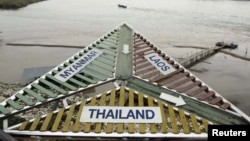BANGKOK —
Ministers of lower Mekong River nations gather in Laos this week for annual meetings of the Mekong River Commission. The MRC, which facilitates management of the river's resources, says they are likely to discuss the controversial Xayaburi Dam project - a key worry of environmentalists.
Water and environment ministers from Cambodia, Laos, Thailand and Vietnam are in Luang Prabang Thursday for meetings of the Mekong River Commission.
The commission was formed in 1995 to better manage the river's resources, but environmental activists say its relevance is being tested by a controversial hydropower dam.
Laos’ dam in Xayaburi province would be the first on the mainstream of the lower Mekong and environmental activists worry it could damage the river and affect the millions of people who live alongside it.
At the last MRC meeting, Cambodia and Vietnam asked for a delay to study its environmental impact. Instead, Laos moved ahead with project-related construction and signed a power purchasing agreement with Thailand.
MRC spokesman Surasak Glahan says since then, Cambodia and Vietnam have not pushed the issue within the MRC.
“And, up until now, the MRC secretariat has not received further update from the member countries on their view regarding the status of the project consultation," he said.
Lao authorities say they made adjustments to the designs of the dam to improve fish migration and sedimentation, but have yet to make the plans public. Regardless, Cambodia and Vietnam seem to be accepting the changes and that the project will go ahead.
Previous MRC-commissioned environmental studies recommended that no dams be built on the mainstream Mekong for at least ten years.
Aviva Imhof is campaign director at environmental group International Rivers. She says that puts the Mekong River Commission's relevance in question.
"If it's not already experiencing a crisis of purpose and confidence, it certainly should be. Because, this commission was set up to negotiate and ensure that there was balanced and fair development of the river and management of the river and yet one country appears to be moving forward without really following the procedures that were agreed upon," she said.
Almost all the electricity from the Xayaburi will be sold to Thailand. A group of Thai activists are suing Thai energy authorities in hopes of stopping the project.
Laos plans to build several more dams on the Mekong in hopes of becoming the so-called “battery of Asia.”
Downstream countries worry the dams could affect key industries. Vietnam's rice production is tied to the river while Cambodians source about 80 percent of their protein from the Mekong.
Some estimates say as many as 20 or more fish species could be wiped out if the dam goes ahead, although most would be larger fish so food security would not be drastically affected.
Marc Goichot is with the World Wide Fund for Nature and based in Laos. He says iconic species such as the Mekong Giant Catfish could become extinct.
"There are so many species in the Mekong and some of them are not even described yet. And, we might lose them before we describe them. It is also very important because the Mekong is probably also one of the places in the world where there is the strongest link between biodiversity and livelihood," he said.
Goichot says the WWF is not against hydropower, but encourages Laos to pursue less risky projects to meet its energy needs.
Impoverished Laos says selling hydropower to its neighbors will help it get out of poverty.
However, International Rivers’ Imhof says dam projects almost always leave people worse off as they are deprived of natural resources.
"And, there's been very little evidence so far that the benefits of the revenue that's been generated from these projects is actually trickling down to those communities that have been most effected," he said.
Environmental activists say part of the problem with dam construction is that not much is not known about the effect on a river until it is completed.
China is the only country that has built hydropower dams on the mainstream of the upper Mekong. Beijing has faced criticism for sharing little data with downstream neighbors or discussing plans for future dam construction.
Ed Grumbine is a guest specialist on biodiversity at China's Kunming Institute of Botany. Speaking via Skype, he tells VOA lower Mekong countries seem to be following China's model, regardless of future consequences.
"The data that we have right now shows that there will be significant impacts from the cumulative operation of China's hydropower dams. The Chinese government does not agree with those surveys. But, then, China has not played ball with the lower Mekong states up to this point," he said.
Grumbine says, to meet their energy needs, Lower Mekong nations should focus on improving energy efficiency, reducing demand and developing alternative energy.




